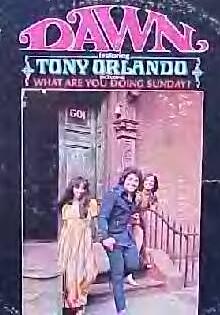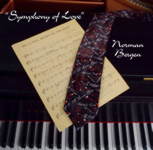BEFORE DAWN
Before Tony Orlando & Dawn, there was Dawn.

1970 LP COVER
Before Dawn, this is what happened.
In early 1970, Dave Appell, then a very successful songwriter and producer from Philadelphia, brought a project toThe Tokens, also a successful production team, which they would co-produce. The artist was a talented singer named Frankie Paris. I was hired as the arranger for two of the four songs, including a new Irwin Levine-Toni Wine composition entitled “Candida”. Dave played Wine’s demo for me and suggested an entirely different groove, which we all liked; pop/latin like some of the Drifters recordings. I wrote the parts for all musicians and backup vocalists. Session players and singers were hired and were recorded with Frankie’s lead vocal. The background vocalists were: Toni Wine, Robin Grean, and Jay Siegel, lead singer of The Tokens. Phil Margo (of The Tokens) played drums with Al Gorgoni on acoustic guitar. Tokens member Hank Medress worked in the sound booth with Dave and engineer Bill Radice; Mitch Margo, the youngest Token, was in the army. This was my only recording without a keyboard; I sat on a stool and conducted the rhythm section of guitars, bass and drums. We added horns, strings, a triangle, and handclaps. “Candida” sounded like a hit. It was brought to Bell Records where they liked everything except the lead vocal. Names like Chubby Checker and Lenny Welch were mentioned as possibilities, but apparently neither one was interested. I suggested a friend, Scott English. Tony Orlando was often mentioned though we would not be able to use his name, as it would be a professional conflict for him. He was then working as general professional manager of CBS Records’ publishing division, April-Blackwood Music. Things eventually worked out and Tony’s lead vocal was recorded. The cut was remixed with the new vocal; the rest of the track remained intact. Bell Records loved it and scheduled the release. Since Orlando’s name could not be used, a name was picked for the ‘group’ – Reign; then it was changed to Dawn. I said ‘whatever we call it– when’s it coming out?’. We all thought it was a perfect summer record and it was released in June. By October it hit #1 in Cash Box magazine and #3 in Billboard, selling 1 & ½ million copies in the U.S. and a total of 3 million worldwide.

Norman’s and Jay’s names are in reversed positions (though both are spelled correctly, unlike Appell and Medress).
We did more than one session for a follow-up single, and the song that was picked was “Knock Three Times” (words again by Levine, music by L. Russell Brown), which went to the top of the charts by Christmas and would become one of the biggest hits of the 70s, selling 3 million in the U.S. and 6 million worldwide, reaching #1 in many parts of the world.
Tony worked out an agreement with Bell Records and put a performance group together as Dawn. This, believe it or not, was the first Dawn.

I’m not certain but it might translate to something about the Supergroup Dawn and an impending trauma. Actually, this was printed in Germany's Bravo magazine early in 1971. We were interviewed and photographed by two German girls for this feature story. They had visited us at our rehearsal space in Manhattan where we were working almost daily in preparation for our first concert: Christmas at Carnegie Hall (1970). It was a fundraiser for underprivileged children sponsored by WABC radio. We would headline and close the show after Mama Cass Elliott, Dave Mason, the Nitty Gritty Dirt Band, and the Five Stairsteps. The day came and it went well, but Tony, with the help of some advisors, decided that this band was not what the public would expect from the name Dawn and those recordings. Obviously, he was right. Tony went on to hire a more glamorous and appropriate-looking Dawn, Joyce Vincent-Wilson and Telma Hopkins. They were beautiful and talented, the perfect Dawn.

My fifteen minutes (plus a few) of fame were over, at least for the time being.
The Early Years: The Catskills, Music Education, Doo-Wopp

